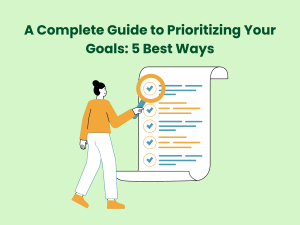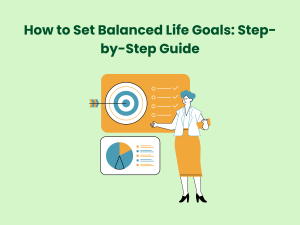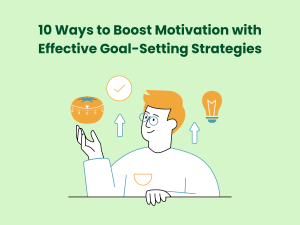Setting clear career goals is crucial for professional fulfillment and advancement. Well-defined objectives help you navigate workplace challenges, upskill strategically and seize opportunities purposefully. Career goals keep you focused amid distractions on what matters most to your ambitions.
What is a Career Goal
A career goal refers to a specific objective or target that an individual sets for their professional development and long-term career success. It represents what someone aspires to achieve in their career over a defined period. Career goals can vary widely depending on individual preferences, aspirations, and the nature of the profession.
Benefits of Career Goals Setting
Establishing robust career goals has many advantages:
- Provides direction and intentionality to move up professionally
- Motivates building job-related skills and expertise through effort
- Creates a benchmark to evaluate if your career is on the right trajectory
- Allows leveraging strengths and passion to maximize work satisfaction
- Opens doors wider by revealing specific development areas to target
- Enables framing workplace decisions in terms of goal alignment
- Boosts perseverance during hardships by invoking your purpose
In short, career goals transform merely working to make a living into strategically crafting your dream career.
Setting Impactful Career Goals
Follow these guidelines for setting robust career goals:
- Make goals specific, measurable, achievable, relevant and time-bound (SMART)
- Set short term goals to build capacities for long term ambitious goals
- Identify development areas and create goals around strengthening them
- Build networks, skills and experiences needed to achieve goals
- Set goals around producing excellent work output, not just promotions
- Balance work goals with lifestyle goals and other priorities
- Re-evaluate goals regularly for relevance as values and interests evolve
- Be flexible to modify timelines if needed but persistent on the end objective
- Identify potential obstacles that may arise so you can prepare solutions proactively.
Career Goals Examples
Examples of career goals might include:
- Advancement: Seeking promotions or climbing the corporate ladder to reach a higher position within the organization.
- Skill Development: Acquiring new skills or enhancing existing ones to stay relevant and competitive in the job market.
- Entrepreneurship: Starting and successfully running one’s own business or venture.
- Financial Success: Achieving a specific level of income, financial stability, or reaching a certain net worth.
- Work-Life Balance: Striking a balance between professional and personal life by managing workload, responsibilities, and personal time effectively.
- Industry Recognition: Becoming a recognized expert or leader in a particular industry or field.
- Career Change: Transitioning to a different career or industry that aligns better with personal interests or values.
- Education and Certification: Obtaining advanced degrees or certifications to enhance qualifications and open up new opportunities.
- Impact and Contribution: Making a meaningful impact in one’s field and contributing to positive change or innovation.
5 Common Career Goal Ideas
Here are some examples of career goals under specific categories:
1. Learning Goals
– Take 2 advanced negotiation courses to gain confidence
– Shadow directors monthly to learn leadership skills
– Read industry books for 1 hour every weekday morning
2. Networking Goals
– Meet 5 new work connections every month through events or introductions
– Grab coffee biweekly with senior colleagues to learn their insights
– Connect quarterly with former colleagues to nurture relationships
3. Skill-Building Goals
– Become advanced Excel power user through daily usage and monthly tutorials
– Improve public speaking skills by presenting at 5 conferences in 2 years
– Learn SEO strategies by completing a certification in 6 months
4. Visibility Goals
– Create professional website and optimize content for SEO in 4 months
– Write for prominent industry publications every quarter
– Start an impactful podcast highlighting career insights in 9 months
5. Promotion Goals
– Identify and meet criteria for reaching next level role by year end
– Drive key cross-functional initiative to boost visibility to leadership
– Proactively set meetings with executives every quarter to share progress
20 Tips for Achieving Career Goals
Achieving career goals requires a combination of strategic planning, dedication, and ongoing effort.
Here are some tips to help you successfully navigate the path toward your career goals:
- Set Clear and Specific Goals:
- Clearly define your career goals, making them specific, measurable, achievable, relevant, and time-bound (SMART).
- Prioritize Your Goals:
- Identify which goals are most critical and prioritize them to focus your efforts effectively.
- Break Down Goals into Milestones:
- Divide long-term goals into smaller, manageable milestones. This makes progress more tangible and achievable.
- Create a Actionable Plan:
- Develop a step-by-step plan outlining the tasks, actions, and resources needed to achieve each goal.
- Build a Strong Professional Network:
- Cultivate relationships with colleagues, mentors, and industry professionals. Networking can provide guidance, opportunities, and support.
- Invest in Continuous Learning:
- Stay updated on industry trends, acquire new skills, and pursue relevant certifications or further education to enhance your qualifications.
- Seek Feedback Regularly:
- Request feedback from supervisors, peers, or mentors to identify areas for improvement and adjust your approach accordingly.
- Embrace Challenges:
- View challenges as opportunities for growth. Overcoming obstacles can lead to valuable experiences and skills.
- Adaptability is Key:
- Be flexible and willing to adjust your goals and strategies based on changes in the industry, market, or personal circumstances.
- Stay Positive and Resilient:
- Maintain a positive mindset and resilience in the face of setbacks. Learn from failures and use them as opportunities to grow.
- Time Management Skills:
- Develop effective time management habits to ensure that you allocate time to work on your goals consistently.
- Build a Strong Personal Brand:
- Cultivate a positive and professional online presence through platforms like LinkedIn. Showcase your skills, achievements, and contributions.
- Track and Celebrate Progress:
- Regularly assess your progress toward your goals. Celebrate small victories for stay motivated and focused.
- Emphasize Soft Skills:
- Develop and showcase soft skills such as communication, teamwork, and leadership, as they are crucial for career advancement.
- Attend Workshops and Conferences:
- Participate in industry-related workshops, conferences, and seminars to stay informed, network, and gain valuable insights.
- Stay Informed About Industry Trends:
- Keep yourself informed about the latest developments in your industry to stay relevant and anticipate changes.
- Seek Mentorship:
- Find a mentor who can provide guidance, share experiences, and offer advice as you work toward your goals.
- Establish a Healthy Work-Life Balance:
- Maintain a balance between professional and personal life to prevent burnout and sustain long-term success.
- Be Proactive:
- Take initiative in your current role, seeking out opportunities for leadership, additional responsibilities, and skill development.
- Regularly Reevaluate and Adjust:
- Periodically reassess your goals and adjust your plan based on your evolving priorities, the industry landscape, and personal circumstances.
Remember that achieving career goals is a continuous journey. Regularly reassess your goals, adapt your strategies, and stay persistent in your pursuit of success.
FAQ About Career Goals
How often should I set new career goals?
Set larger 5-10 year career goals and review them every 2-3 years. Have 1-3 year medium-term goals and 6-12 month short-term goals.
What if my current job isn’t aligned with my career goals?
Identify if aspects of your job can be reframed for goal alignment before considering a switch. Weigh tradeoffs of switching versus improving current role.
What if my career goals seem unrealistic?
Break overwhelming goals into smaller milestones to build confidence and capabilities. Be flexible on timeframes. Get input from mentors in achieving similar feats.
What if I achieve a goal but feel dissatisfied?
Evaluate if the goal truly resonated with your strengths and passions. Accomplishment without fulfillment indicates misaligned goals.
What if I struggle to stay motivated on career goals?
Connect goals directly to your core values and purpose. Reward goal progress consistently. Share journeys with trusted friends for accountability.
In closing, career goals transform aimless drifting into targeted waves that carry you higher. Point yourself purposefully towards that professional harbor you envision.



